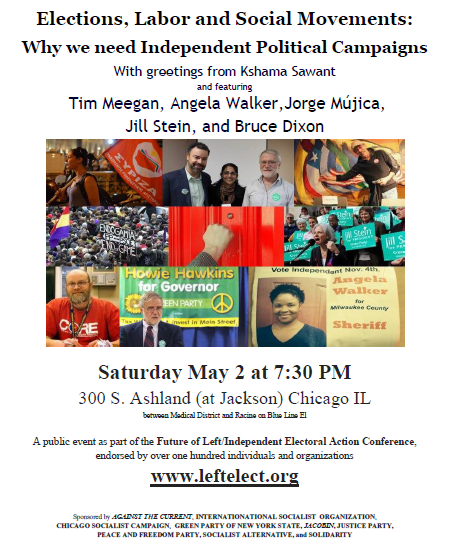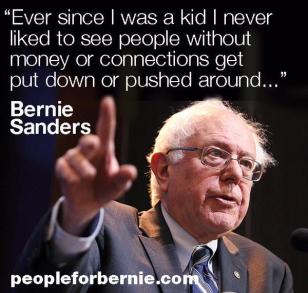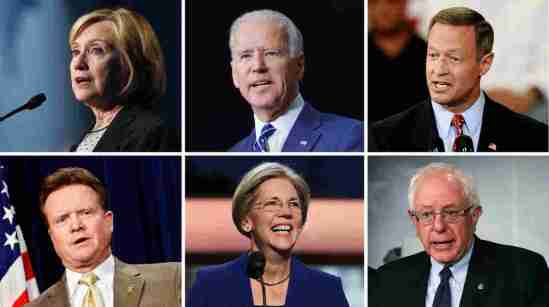The 2008 Democratic presidential primary fight proved that the Clinton machine can be beaten despite enjoying enormous advantages in terms of funding, connections, and name recognition. The question is: can Bernie Sanders repeat in 2016 what no one thought possible in 2008? Although Sanders can’t mechanically follow candidate Barack Obama’s playbook, team Sanders has to adapt some of that playbook’s strategic principles to have a shot at winning.
Tag Archives: Bernie Sanders
Is the Democratic Party a Capitalist Party? Not Exactly
Mark Lause, in his denunciation of Democratic Socialists of America’s support of the leftmost Democrats, claims that every single Democrat is a “Wall Street flunky.” I must assume that this means that he thinks that every single Democrat is taking cash from finance capital, if not some other corporate source.

Socialist Upton Sinclair — 1934 Democratic Gubenatorial Candidate and Wall Street Flunky?
One Divides into Three? A Report on the U.S. Left Unity Conference
By Ethan Young
Dan La Botz’s description of the Future of the Left/Independent Politics Conference makes another introduction redundant. Instead, I’ll add my own observations. I come from the other side of this discussion: I hold with the ‘inside/outside’ approach to electoral politics, as pushed by the late Arthur Kinoy, a radical lawyer who led the National Committee for Independent Political Action in the 1970s and 1980s. Putting it simply, I supported left independent Barry Commoner for president in 1980, and Democrat Harold Washington for mayor of Chicago in 1983. This year, I support Kshama Sawant and Bernie Sanders.
I see no contradiction – in fact I think it’s the only approach that makes sense. Continue reading
Top 10 Reasons You Should Vote Bernie Sanders in 2016
Comradely Greetings to the Independent Electoral Action Conference from Bernie Sanders

Dear Friends in Chicago,
I’ve asked my fellow Vermonters Corey Decker and Jeremy Hansen to convey my very best wishes for a productive and successful conference this weekend. We need many more people like you, throughout our country, who are willing to challenge the stranglehold of big money on politics. Continue reading
When Principle Collides with Reality and Common Sense: Socialist Alternative’s Enthusiastic Non-Endorsement of Bernie Sanders
“We will be campaigning with Sanders supporters against the corporate politicians while politically arguing for Sanders to run all-out through the November 2016 election, as a step toward building an independent political alternative for working people.”
This is the conclusion of Socialist Alternative’s wide-ranging and enthusiastic article about Bernie Sanders’ 2016 presidential run. Although it’s a welcome break from the vitriolic sectarian humbug about Sanders peddled by the likes of Black Agenda Report and Socialist Worker, the article doesn’t actually endorse him!

How Fringe and Spoiler Campaigns Hurt Rather than Help Independent and Left Politics
A nasty debate is brewing on the American left over what to do about Bernie Sanders’ campaign for the 2016 Democratic presidential nomination and most of the nastiness is on the anti-Sanders side. Now that Sanders is trending upwards in polls (tripling in Iowa from 5% to 15% and reaching 18% in New Hampshire, two key early primary states) liberals are starting to get hysterical. Articles like “Bernie Sanders Is Already Making It More Likely Republicans Win The White House In 2016” will soon become the norm from this crowd as the primary contest heats up and the Establishment front-runner Hillary Clinton has to defend her Iraq war vote and pro-free trade stance against Sanders’ anti-war, anti-free trade record in six live television debates. Continue reading
Sanders’ Campaign: Shell Game to Save the Two-Party System or Third Party Breeding Ground?
Arun Gupta’s “The Only Article You Need to Read About the 2016 Election” avoids the typical, weak ‘left’ objections to Bernie Sanders’ decision to seek the Democratic Party’s presidential nomination and bases itself instead on undisputable facts — namely, that “progressive challenges [to] the mainstream Democratic candidates” such as Dennis Kucinich in 2004 or Progressives for Obama of 2008 have not dragged the Democratic Party to the left politically but instead dragged progressives and socialists to the right. Gupta’s argument is that this is will be the social function and/or objective outcome of Sanders’ campaign, its socialist gloss and the genuinely oppositional intentions of its participants notwithstanding. Continue reading
What Socialist Worker Got Wrong About Vermont Politics
From a reader (with minor edits).
Overall: The premise of the Socialist Worker article is that had Bernie decided to challenge Peter Shumlin for the Gubernatorial office, he could have used that position as a base to build a statewide Progressive Party analogous to the organization he built in Burlington. That’s unlikely, and here is why: Continue reading
Can Bernie Sanders Win the 2016 General Election?
Serious questions demand serious answers. To seriously answer the question of whether Bernie Sanders could win the November 2016 election, Sanders supporters must put aside our preferences and partisanship to soberly appraise the likely terrain of the 2016 Electoral College and how Sanders would fit into that context as the Democratic nominee.
Safe and Swing States and Sanders
In the past 6 consecutive presidential races, the Democratic nominee has won 18 states and the District of Colombia for a total of 242 votes in the Electoral College while the Republican nominee has won 13 states for a total of 102 electoral votes. States that vote reliably Democratic (blue states) or Republican (red states) are what’s known in American electoral jargon as “safe states” while the states that could vote in either direction are known as “swing states.” Continue reading
Why Pundits Are Wrong About Hillary Clinton’s ‘Inevitable’ Victory Over Bernie Sanders
The corporate commentariat anointed Hillary Clinton the winner of the fight for Democratic Party presidential nomination less than 24 hours after Bernie Sanders declared his candidacy. Nate Cohn of the New York Times writes, “The left wing of the Democratic Party just isn’t big enough to support a challenge to the left of a mainstream liberal Democrat like Mrs. Clinton” and Bill Sher of Politico notes, “With Clinton generally polling around 60 percent among Democrats, having four candidates divvy up the remaining tally is a recipe for a Hillary coronation.” Even the usually careful, data-driven site FiveThirtyEight.com exclaims that Sanders “doesn’t have a shot” since “polls show Sanders doesn’t match up well against Clinton. He trails her by nearly 57 percentage points nationally, 54 percentage points in Iowa and 40 percentage points in New Hampshire.”
Here’s why three big reasons why they’re wrong. Continue reading
The Case for Bernie: Part 2
By Dustin Guastella
The Democratic Field: Clinton v. Warren v. Bernie
The media have already christened Hillary Clinton as the Democratic nominee. Clinton’s coronation should come as no surprise, as she has positioned herself as a friend of Wall Street (and Wal-Mart). She advocates fiscal discipline and so-called “privatized Keynesianism” and takes her political advice from “the markets.” She prides herself on her role in gutting welfare, her aggressive foreign policy and her close relationships with Republican leaders. Most damning of all: BENGHAZI! I don’t think I have to convince readers of this blog that she is the epitome of a neoliberal Democrat and her candidacy represents what Tariq Ali calls “the extreme center”.
The Case for Bernie: Part 1
By Dustin Guastella
Senator Bernie Sanders has been mulling over a presidential run for the past few months and is set to make an announcement this week or next about his potential candidacy. Bernie, a self-proclaimed and vocal socialist, is a talented campaigner, a remarkably successful politician and broadly popular across the ideological spectrum in his home state. Should he decide to run, socialists need to play an active role in building his campaign, but we also need to think carefully about why a Bernie candidacy is important and how socialists should best support and shape such a campaign. For starters, I don’t think socialists should work for Bernie in the hopes of “reclaiming” the Democratic Party (when was it ours to begin with?). Further, Bernie’s presidential run shouldn’t be seen as a means to pull Clinton to the left, a failing strategy for sure. Continue reading
How Upton Sinclair Upended California’s Democratic Party and the Lessons for Bernie Sanders’ 2016 Run
Never in American history has a socialist been elected governor of a state, but in 1934 Upton Sinclair came close. He almost became governor on a program known as EPIC — End Poverty in California.
American socialists typically think of Eugene V. Debs’ 1912 presidential campaign as the high point of their movement since Debs won 6% of the vote, or just over 900,000 votes. Sinclair nearly matched that in 1934 by winning 879,000 votes, some 37% of the electorate. With two dozen EPIC candidates elected to the California legislature in 1934, Sinclair’s 37% was a far more politically meaningful result than Debs’ one-in-a-lifetime single-digit showing.
Despite nearly matching Debs’ power at his peak, the EPIC Sinclair campaign of 1934 has all but disappeared from the historical memory of American socialism. Almost a century later, it is the greatest story never told. These days, EPIC warrants but a single misleading mention by one Leninist journal and seems forgotten by the Democratic Socialist of America, a group that advocates the very strategy Sinclair and his followers pursued in 1934 — capturing the Democratic Party for socialism.



